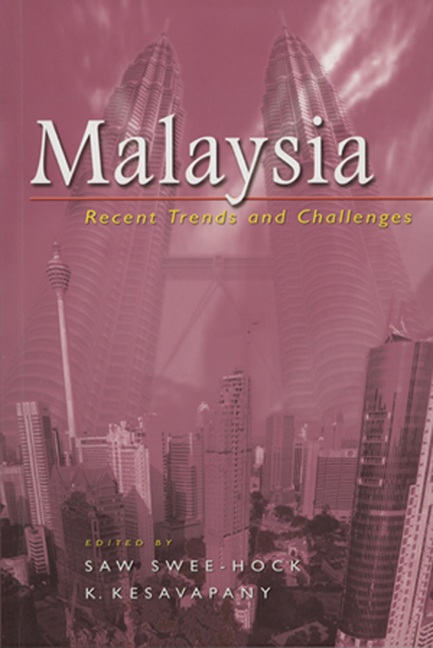Book contents
- Frontmatter
- Content
- Preface
- Foreword
- Contributors
- 1 Population Trends and Patterns in Multiracial Malaysia
- 2 The Emerging Politics of Islam Hadhari
- 3 Bangsa Malaysia: Vision or Spin?
- 4 The 2004 Malaysian General Elections: Economic Development, Electoral Trends, and the Decline of the Opposition
- 5 The UMNO-PAS Struggle: Analysis of PAS's Defeat in 2004
- 6 The Malay Electorate in 2004: Reversing the 1999 Result?
- 7 UMNO and BN in the 2004 Election: The Political Culture of Complex Identities
- 8 Malaysia's Civil Service Reform: Mahathir's Legacies and Abdullah's Challenges
- 9 Reinventing Governance in Corporate Malaysia: The Challenges Ahead
- 10 Globalisation and Ethnic Integration in Malaysian Education
- 11 Globalisation and the Challenges Facing Malaysia's Economy
- 12 Promising Start to Malaysia-Singapore Relations
- Bibliography
- Index
8 - Malaysia's Civil Service Reform: Mahathir's Legacies and Abdullah's Challenges
Published online by Cambridge University Press: 21 October 2015
- Frontmatter
- Content
- Preface
- Foreword
- Contributors
- 1 Population Trends and Patterns in Multiracial Malaysia
- 2 The Emerging Politics of Islam Hadhari
- 3 Bangsa Malaysia: Vision or Spin?
- 4 The 2004 Malaysian General Elections: Economic Development, Electoral Trends, and the Decline of the Opposition
- 5 The UMNO-PAS Struggle: Analysis of PAS's Defeat in 2004
- 6 The Malay Electorate in 2004: Reversing the 1999 Result?
- 7 UMNO and BN in the 2004 Election: The Political Culture of Complex Identities
- 8 Malaysia's Civil Service Reform: Mahathir's Legacies and Abdullah's Challenges
- 9 Reinventing Governance in Corporate Malaysia: The Challenges Ahead
- 10 Globalisation and Ethnic Integration in Malaysian Education
- 11 Globalisation and the Challenges Facing Malaysia's Economy
- 12 Promising Start to Malaysia-Singapore Relations
- Bibliography
- Index
Summary
Introduction
Since Malaysia's independence in 1957, administrative reform efforts in the country have been moving ahead at a rapid pace. Under Mahathir, such reform efforts have been further reinforced with much conviction as well as rhetoric. His administration picked up the new public management (NPM) paradigm. New civil service reform programmes, together with their problems, emerged in the mid-1990s amidst major political and economic transformations in the country.
When Abdullah Badawi was sworn in as the fifth prime minister of Malaysia in 2003, he inherited the weaknesses and strengths of the reform programmes as well as the intended and unintended consequences of Mahathir's relentless efforts in transforming the country. The perennial issues of performance, efficiency, control, and accountability (or the lack of) in the Malaysian civil service remain major challenges for Abdullah. He has pledged, after the landslide victory of the 11th general election, to take Malaysia towards “excellence, glory, and distinction”. The bureaucracy, as a tool of policy implementation, will be a major player in the process.
This chapter surveys the administrative reform initiatives in Malaysia, focusing, in particular, on developments during the Mahathir administration and the challenges that confront the Abdullah administration. It argues that both internal and external changes have forced the Malaysian administrative apparatus to adjust and respond rapidly in the Mahathir administration, and these forces will remain significant in the Abdullah administration. In addition, Abdullah's pledges to improve bureaucratic efficiency and minimising corruption would prove to be difficult to fulfil if entrenched and stubborn political and bureaucratic resistance are not removed.
Administrative Reforms: Malaysian Style
The Malaysian political elite's approach is consistent with the general belief that administrative reform is a prerequisite for significant growth on the development front. Civil service reforms — broadly defined “an organizational, instrumental, problem-related change of government and the public sector to meet environmental demands and require-ments” — were initiated by the United Malays’ National Organization (UMNO)-dominated Barisan Nasional (BN) government in the past 40 years.
- Type
- Chapter
- Information
- MalaysiaRecent Trends and Challenges, pp. 195 - 209Publisher: ISEAS–Yusof Ishak InstitutePrint publication year: 2005

